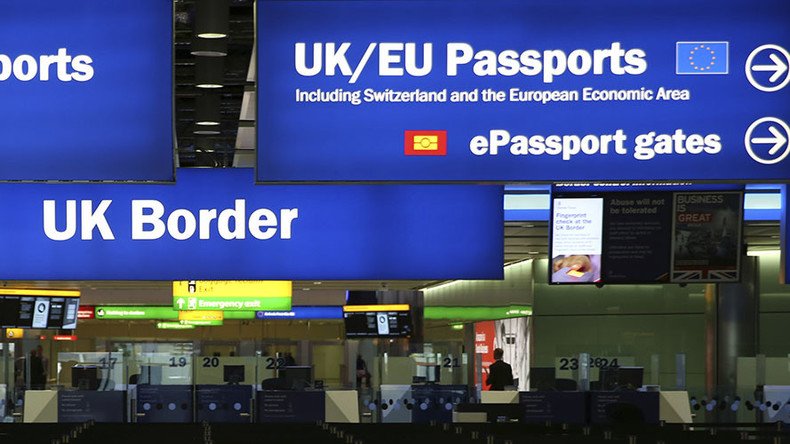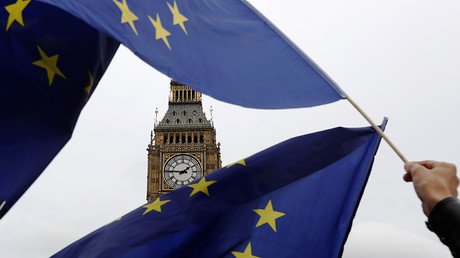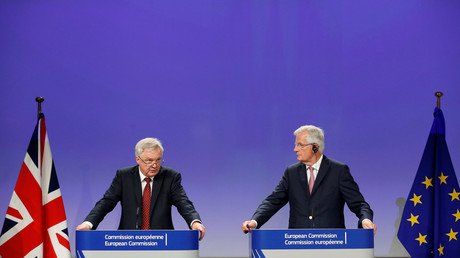Brexit plans in chaos as govt contradicts itself over migrant free movement

As the government announced the start of a year-long study on the effects of EU migration, to help ministers craft a post-Brexit immigration system, Tory MPs have been making contradictory remarks on when exactly free movement will end.
Home Secretary Amber Rudd has commissioned the Migration Advisory Committee to carry out a detailed analysis of the role of EU nationals in the UK economy and society. The report will inform new rules for immigration after Britain leaves the bloc and the free movement of people ends.
Announcing the study, Rudd said the government would seek a transitional arrangement, likely to involve the continuation of free movement for a period, to ensure there would be no “cliff edge” for employers or EU nationals in the country.
Just hours later, however, Immigration Minister Brandon Lewis vowed that free movement of people would not continue after March 2019, when Britain is set to exit the bloc formally.
Speaking to the BBC, Lewis said the UK would have a new immigration system in place in just 20 months’ time.
“Free movement of labor ends when we leave the European Union in the spring of 2019 - we’re very clear about that.”
Asked whether trade and single market access would also end on that date, Lewis said: “There’s a period of negotiation we’re going through with the European Union at the moment, but we’re very clear that free movement ends … when we leave.”
In the interview, Lewis also repeatedly failed to say whether the Tories would achieve their manifesto pledge to bring migration down to the tens of thousands by the end of this parliament in 2022.
“It’s not a straightforward issue. We cannot control our net migration levels fully until we leave the European Union,” he said.
Deloitte in June showed that more than one million foreign workers are preparing to ditch Britain by 2020, raising the prospect of an economic brain drain.
Rudd’s study will focus on patterns of migration from Europe, considering factors such as regional distribution, skill levels, and seasonal workers.
Advisers will be tasked with examining issues such as the economic and social “costs and benefits” of EU migration, and the potential impact of any fall in arrivals from the bloc.
It will also consider which sectors are the most reliant on EU labor and whether there is any evidence that the availability of unskilled labor has led to low UK investment in certain areas.
With the findings not due to be published for more than 12 months, however, the move is unlikely to placate trade bodies and business groups representing companies that are hugely dependent on labor from abroad. The study will be published just seven months before Britain is set to formally leave the bloc in March 2019.
Labour MP Heidi Alexander, a leading supporter of Open Britain, which campaigns for a soft Brexit, is questioning why the work has only just begun, more than a year after the EU referendum.
“It beggars belief that the government has taken a year to get round to asking for expert evidence on the role played by EU nationals in our country,” Alexander told the Guardian.
“Our immigration policy has been governed by anecdote and scaremongering, rather than evidence, since the moment Theresa May set foot in the Home Office in 2010. The timing of this announcement shows the total lack of preparation and understanding that has typified this government’s attitude to Brexit so far.”
Ed Davey, the Liberal Democrat home affairs spokesperson, agreed that the study had come a year too late.
He told the newspaper: “The government needs to explain why this study wasn’t commissioned a year ago, directly after the referendum.
“The NHS, businesses, and universities that depend on European citizens need answers now, not in another 14 months’ time. Ministers must explain how their negotiations will minimize the damage Brexit will do to our economy and public services.”














